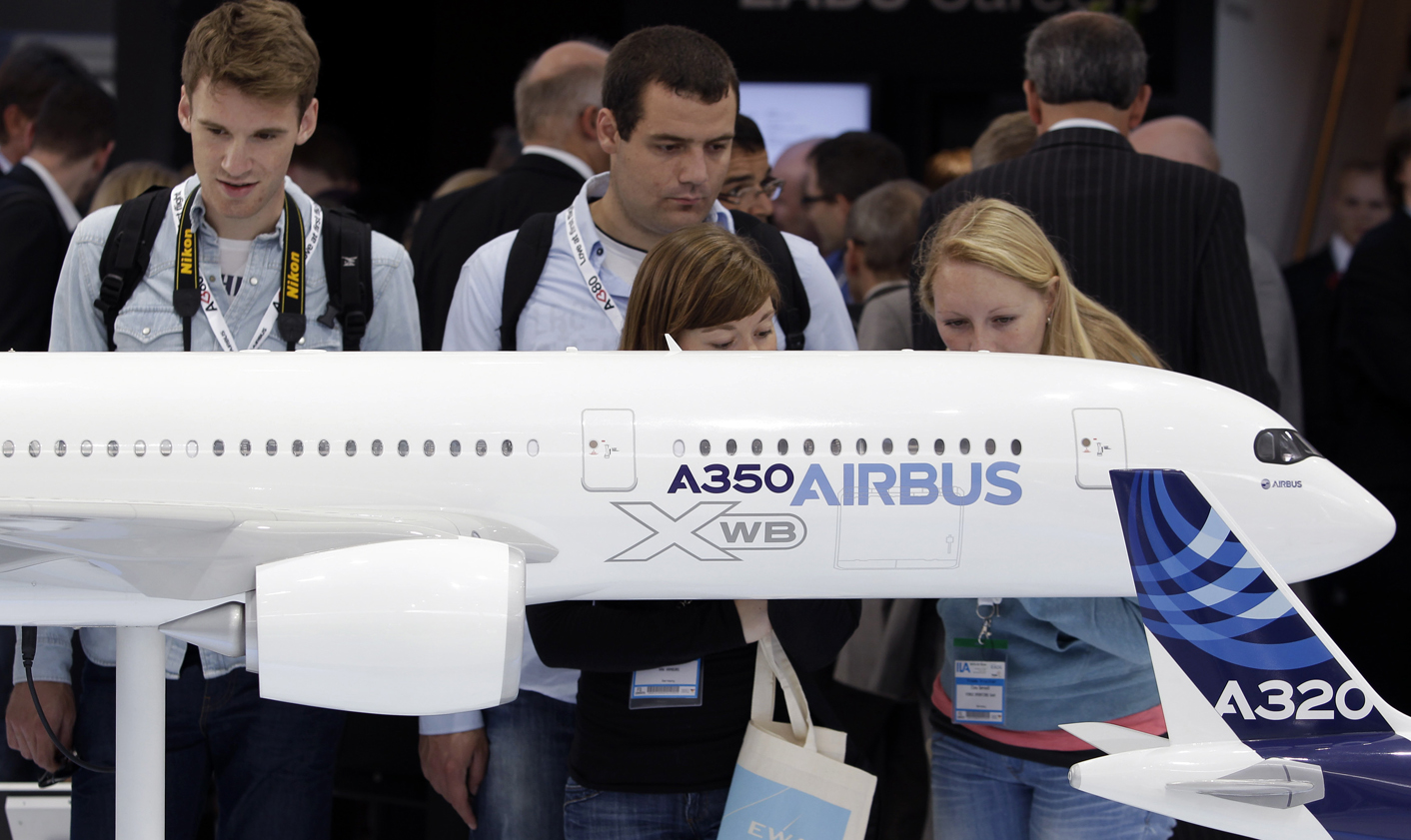The acrimonious collapse followed weeks of tense negotiations and triggered recriminations between capitals.
Securing such an enormous and complex cross-border deal in a sector where commercial considerations are typically trumped by political, economic and national security concerns was always going to be desperately difficult.
The merger hinged on France and Germany accepting a more limited role in the combined firm than they have wielded in the past at EADS, maker of Airbus aircraft. In the end, it was Berlin, rather than Paris, that proved the problem.
"We had clear red lines that we were not willing to go beyond, relative to engagement and involvement of governments," BAE's CEO Ian King said. "If that was going to impinge on our ability to commercially run this new merged organisation, and support and develop our existing business, then we wouldn't go to that point, and that is where we are today."
Asked if he had encountered more problems with Berlin than Paris, he said: "That would be an accurate representation."
EADS chief executive Tom Enders, himself a German, said: "It is, of course, a pity we didn't succeed, but I'm glad we tried. I'm sure there will be other challenges we'll tackle together in the future."
A source close to the talks said the companies had met all of Berlin's requests and were baffled as to why Chancellor Angela Merkel's government blocked the deal.
"Germany blocked the deal, although all demands from the German side were met," the source said. "Top German negotiator Lars-Hendrik Roeller was the one who formulated all demands and said no in the end." Roeller is Merkel's economic adviser.
But German officials said they were ultimately unconvinced by the commercial logic of combining the Airbus maker with a British firm whose biggest customer is the Pentagon on behalf of the U.S. military.
"We started asking ourselves, 'Does this deal really make sense?'" one senior German official said. "The market went down, investors were against it, the synergies were unclear, as was U.S. market access with the big state shareholdings."
Many EADS shareholders had also opposed the deal, and the firm's share price rose more than 5 percent on Wednesday.
BAE SEEKS CURBS ON STATE INFLUENCE
Europe's two largest aerospace groups have very different ownership structures. BAE is a private British company, and the American armed forces account for nearly half of its revenue. Because Washington is reluctant to give contracts to firms influenced by foreign governments, BAE considers minimising state control as crucial to its business.
EADS has a more complicated share structure that gives big influence to German and French industrial groups and the French state. To keep its influence at the combined firm, Germany would have had to buy out a holding by engineering firm Daimler.
Many Germans see EADS as primarily a civilian planemaker. Making a large investment in a trans-Atlantic arms firm could be politically uncomfortable in Germany, which has a post-World War Two history of pacifism.
"This would have created the biggest defence company in the world," said a second source close to Merkel. "But defence is an especially sensitive subject in Germany."
Ultimately, German officials said the parties were unable to resolve the shareholding issue to everyone's satisfaction. Paris wanted to retain the option of going up to 13.5 percent by buying a stake held by French firm Lagardere at a later date. German officials insisted they be able to follow suit.
The British wanted a cap of 10 percent each, concerned that the Germans and French could approach a blocking minority if they went above that level.
Still, the companies believed they could have bridged the differences if Germany was more willing to negotiate.
"France and the UK agreed that Germany have the same stakeholding as France in the merged group. Separately, vast guarantees were given regarding safeguarding national security interests, sites, jobs. The topic of headquarters was being discussed very emotionally, but not an issue big enough to let the deal fail," a source close to the transaction said.
RIVAL TO BOEING
The companies had until Wednesday afternoon to declare their intentions and either scrap the merger, ask British regulators for more time or finalise their plans. The merger would have created a group employing nearly a quarter of a million people that could better compete with U.S. rival Boeing.
Analysts called the breakdown a severe blow especially for BAE boss King, who had faced a revolt from his company's largest shareholder, Invesco. BAE could now become a takeover target, perhaps from U.S. defence rivals.
Asked whether BAE management felt under pressure as a result of the stormy investor reaction followed by the collapse of the plans, King said: "Certainly not. No more than usual".
French President Francois Hollande said the decision to end merger talks lay with the companies, and his government's intervention was limited to stating its conditions.
Britain backed the deal and has largely supported BAE's case that French and German influence would have to be limited to make the deal work, especially given BAE's vast U.S. business.
The deal's failure is arguably a setback for Prime Minister David Cameron. A source familiar with the negotiations said Cameron spoke to Merkel about the deal on Tuesday but failed to persuade her to lift objections.
"Our view is that for this company as a merged entity to have been successful, it would have needed to be able to operate as a commercial company free of undue control or influence by any single government and that's something that the company evidently has decided it is not able to achieve," British Defence Secretary Philip Hammond said.
A British source familiar with the deal also suggested Berlin, rather than Paris, was the holdout.
"It was absolutely heading in the right direction," the source said of the talks. "There was very significant (British) progress with France. There wasn't the same progress elsewhere."
BAE SHARES DOWN, EADS UP
With global defence spending declining and the civil aviation sector robust, BAE probably needed the deal more than the Airbus maker. Ultimately, investors saw the collapse of the deal as bad news for BAE and good news for EADS. BAE shares closed down 1.38 percent at 320.9 pence in London, while EADS shares were up 5.29 percent at 27.480 euros in Paris.
Barry Norris, founding partner at Argonaut Capital Partners, an EADS shareholder, said: "Today's decision to terminate the merger talks is a triumph for common sense and shareholder value. Having sunk almost 30 billion euros into new Airbus plane projects, which are only now beginning to break even, it made no sense for EADS to now share this with BAE shareholders.
"Continuing merger negotiations would have resulted in a long battle with shareholders and sustained tension over weak corporate governance. That the problems in executing the deal proved too complex should be a source of celebration rather than regret," he added.
It is still conceivable that a deal could be resurrected, although there were no indications that this was being discussed. Brinkmanship is common in European negotiations. EADS - whose full title is the European Aeronautic Defence and Space Company - was itself only created after talks about its structure collapsed and were resurrected weeks later.
The merger had faced growing unease from investors in both companies who complained they were lacking information. Many people had bought shares in EADS on the strength of its growing Airbus civil unit, rather than its defence ambitions, while BAE investors were attracted by its dividend yield.
"While BAE's long-term prospects could still be quite excellent, the failed merger will leave the firm much more exposed to uncertain factors beyond its control, such as major declines in the U.S. defence budget and potential losses in an increasingly competitive international defence market," said David Reeths, consultant at defence analyst IHS Jane's.
BAE CEO King and Chairman Dick Olver said after the merger talks ended that the company's dividend policy would continue and that it was not looking for a tie-up with another company. They also said management would be staying in place.
The British government holds a golden share in BAE that allows it to block foreign takeovers.
Germany does not currently have a direct stake in EADS, but is represented by industrial ally Daimler AG, which holds just over 22 percent and aims to reduce its stake. France holds an identical stake, split between the state and French publisher Lagardere.
Adding to the hurdles facing the deal, BAE's largest shareholder, fund manager Invesco Perpetual, with 13.3 percent, had said it was not convinced of the rationale for the deal.
A source with the Spanish government, which holds a 5.5 percent share in EADS, said: "In the short term this guarantees Spain's stake in EADS from being diluted, but of course a big long-term opportunity has been lost." DM
Photo: Visitors look at an A350 aircraft miniature at the EADS booth during the ILA Berlin Air Show in Selchow near Schoenefeld south of Berlin on September 13, 2012. REUTERS/Tobias Schwarz





